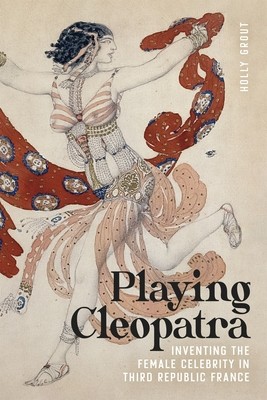
- We will send in 10–14 business days.
- Author: Holly Grout
- Publisher: LSU Press
- ISBN-10: 0807181781
- ISBN-13: 9780807181782
- Format: 15.2 x 22.9 x 1.8 cm, kieti viršeliai
- Language: English
- SAVE -10% with code: EXTRA
Reviews
Description
Questions about the meaning of womanhood and femininity loomed large in late nineteenth- and early twentieth-century French culture. In Playing Cleopatra, Holly Grout uses the theater--specifically, Parisian stage performances of the Egyptian queen Cleopatra by Sarah Bernhardt, Colette, and Josephine Baker--to explore these cultural and political debates. How and why did portrayals of Cleopatra influence French attitudes regarding race, sexuality, and gender? To what extent did Bernhardt, Colette, and Baker manipulate the image of Cleopatra to challenge social norms and to generate new models of womanhood? Why was Cleopatra--an ancient, mythologized queen--the chosen vehicle for these spectacular expressions of modern womanhood?
In the context of late nineteenth-century Egyptomania, Cleopatra's eroticized image--as well as her controversial legacy of female empowerment--resonated in new ways with a French public engaged in reassessing feminine sexuality, racialized beauty, and national identity. By playing Cleopatra, Bernhardt, Colette, and Baker did more than personify a character; they embodied the myriad ways in which celebrity was racialized, gendered, and commoditized, and they generated a model of female stardom that set the stage for twentieth-century celebrity long before the Hollywood machine's mass manufacture of "stars." At the same time, these women engaged with broader debates regarding the meaning of womanhood, celebrity, and Frenchness in the tumultuous decades before World War II. Drawing on plays, periodicals, autobiographies, personal letters, memoirs, novels, works of art, and legislation, Playing Cleopatra contributes to a growing body of literature that examines how individuals subverted the prevailing gender norms that governed relations between the sexes in liberal democratic regimes. By offering employment, visibility, and notoriety, the theater provided an especially empowering world for women, in which the roles they played both reflected and challenged contemporary cultural currents. Through the various iterations in which Bernhardt, Colette, and Baker played Cleopatra, they not only resurrected an ancient queen but also appropriated her mystique to construct new narratives of womanhood.EXTRA 10 % discount with code: EXTRA
The promotion ends in 21d.04:21:17
The discount code is valid when purchasing from 10 €. Discounts do not stack.
- Author: Holly Grout
- Publisher: LSU Press
- ISBN-10: 0807181781
- ISBN-13: 9780807181782
- Format: 15.2 x 22.9 x 1.8 cm, kieti viršeliai
- Language: English English
Questions about the meaning of womanhood and femininity loomed large in late nineteenth- and early twentieth-century French culture. In Playing Cleopatra, Holly Grout uses the theater--specifically, Parisian stage performances of the Egyptian queen Cleopatra by Sarah Bernhardt, Colette, and Josephine Baker--to explore these cultural and political debates. How and why did portrayals of Cleopatra influence French attitudes regarding race, sexuality, and gender? To what extent did Bernhardt, Colette, and Baker manipulate the image of Cleopatra to challenge social norms and to generate new models of womanhood? Why was Cleopatra--an ancient, mythologized queen--the chosen vehicle for these spectacular expressions of modern womanhood?
In the context of late nineteenth-century Egyptomania, Cleopatra's eroticized image--as well as her controversial legacy of female empowerment--resonated in new ways with a French public engaged in reassessing feminine sexuality, racialized beauty, and national identity. By playing Cleopatra, Bernhardt, Colette, and Baker did more than personify a character; they embodied the myriad ways in which celebrity was racialized, gendered, and commoditized, and they generated a model of female stardom that set the stage for twentieth-century celebrity long before the Hollywood machine's mass manufacture of "stars." At the same time, these women engaged with broader debates regarding the meaning of womanhood, celebrity, and Frenchness in the tumultuous decades before World War II. Drawing on plays, periodicals, autobiographies, personal letters, memoirs, novels, works of art, and legislation, Playing Cleopatra contributes to a growing body of literature that examines how individuals subverted the prevailing gender norms that governed relations between the sexes in liberal democratic regimes. By offering employment, visibility, and notoriety, the theater provided an especially empowering world for women, in which the roles they played both reflected and challenged contemporary cultural currents. Through the various iterations in which Bernhardt, Colette, and Baker played Cleopatra, they not only resurrected an ancient queen but also appropriated her mystique to construct new narratives of womanhood.

Reviews